Trust-Based Blog
Reimagining philanthropy begins with learning out loud.

Learning out loud by sharing ideas, with curiosity and humility, the Trust-Based Philanthropy Project blog features updates from the Trust-Based Philanthropy Project as well as stories from grantmakers and nonprofits sharing their lessons, questions, and aha-moments about their experience with trust-based philanthropy.
2026
For the Trust-Based Philanthropy Project, 2025 was a year of responsive action, inquiries, and experiments. This work yielded some wins, some challenges, and some profound lessons. We are taking stock of the invaluable lessons gained over the last year, and what it means for our work ahead.
2025
Findings from Global Fund for Children’s Global Impact Study reveal that trust isn't just a nice-to-have in philanthropy—it's the foundation that makes everything else possible, from supportive relationships to flexible funding that ripples into communities.
This 2-pager highlights the latest information about the impact of federal actions on nonprofits and the communities they’re serving — and, more importantly, what funders can do to show up in solidarity.
Funders can use their voice and influence to amplify their grantmaking, something that is particularly important as nonprofits face a dearth of funds. From signing pledges to signal solidarity and take action to bold peer-to-peer calls to action and transparent communication, family philanthropy is using its voice to meet the moment.
This isn’t a time for philanthropy to be merely responsive but a time to think differently about our work as funders, including about our payout rate; how we deploy resources and show up as civic institutions; and how we listen to the people whose lives are being impacted daily.
From 2020 to 2024, the Trust-Based Philanthropy Project, alongside our wonderful network of partners and allies, took trust-based philanthropy from a concept to a movement. Now, we are building upon that momentum — tapping into our people power and relationships to mobilize a collective commitment for trust-based action.
Funders, now is the time to do everything within your power to move in solidarity with nonprofits, mobilize money, and nurture possibility. Sign the commitment, share this with peers, and join the growing community of grantmakers and donors taking trust-based, courageous action on behalf of our sector.
2024
Through economics crises, a global pandemic, and hostile administrations, nonprofits have remained steadfast in supporting the communities hit the hardest. Here are five ways funders can show up as trustworthy stewards amid growing threats.
Dig into our 2024 survey, where 573 grantmakers shared their perspectives on personal motivations for pursuing trust-based philanthropy, how they use terminology, how they’ve shifted to trust-based practices and operations, and what made those changes possible.
Brenda Solórzano reflects on over 7 years at Headwaters Foundation and what she’s learned about TBP along the way. (Reposted from The Giving Practice at Philanthropy Northwest)
Last week, Trees, Water & People (TWP) released the short film In The Right Hands - Trusting Community to Guide Philanthropy.
The Trust-Based Philanthropy Project is embarking on a new chapter. As we approach our 5-year anniversary, we are poised to realize our once-radical dream: making trust-based philanthropy the standard of practice for effective, equitable philanthropy. Read more about what the next chapter looks like.
Since 2022, Constellations has raised $13M and redistributed over $7.2M to build BIPOC-led narrative and cultural power in regions across the country. Erin Williams and Cinthia Carvajal reflect on the process and share learnings from their network.
In the labyrinth of nonprofit fundraising, Black-led organizations navigate a landscape often obscured by systemic inequities and disparities. Beth Leigh reflects on the glaring disparities in funding allocation and the uphill battle for unrestricted support.
Several years ago, several nonprofit CEOs in Michigan came up with a big idea: what if they could come together to more intentionally meet the needs of youth and families in their community? Danielle Sielatycki, chief executive officer of Prevention Works shares how trust goes deeper than unrestricted funding.
While trust-based philanthropy often focuses on the role of grantmakers in alleviating power imbalances. Vendors and consultants play an important role in reinforcing or reimagining harmful practices.
Trust alone won’t build a more equitable and effective nonprofit sector and democratic society. It requires donors to reckon with systemic inequity and their implicit biases.
While philanthropy can and often does support nonprofits to create a positive impact, philanthropy also has a track record of unintended negative consequences for the organizations and communities we serve. Stacey Faella, executive director of the Woodcock Foundation shares what it looks like to apply a trust-based approach to impact investing and offers next steps on what funders & investors can do.
While a significant number of grantmakers are actively operationalizing trust-based philanthropy within their organizations, many find friction when it comes to making the case with certain stakeholders. Hearing critiques help us to refine and reiterate our talking points in a way that meets people where they are.
The perspectives in this supplement with Stanford Social Innovation Review shed light on what trust-based philanthropy all about, and what it looks like in a range of contexts. They reinforce that trust-based philanthropy is highly strategic, deeply relational, and sometimes messy; and that this work is necessary in order to advance a more just and equitable future.
One of the most oversimplified misperceptions of trust-based philanthropy is that it is about giving money with no strings attached. This opens the door for critics to make unfounded claims about trust-based philanthropy as loose, unstrategic, and lacking in accountability and outcomes.
2023
Philanthropy is full of trends. We oversaturate the field with programming, resources, and think-pieces responding to the latest buzz. We write reports, host roundtables, and do interviews elevating the “hot topics” funders are grappling with. So why are we still talking about trust-based philanthropy?
The Trust-Based Philanthropy Project is pleased to announce this multi-part series exploring the relationship between trust-based philanthropy and racial equity including why a racial equity lens is needed, what a racial equity lens is in a trust-based approach, and how to operationalize it.
The rise of trust-based philanthropy has led to a dramatic increase in funders referring to themselves as “trust-based.” Some of those funders are genuinely committed to the nuanced and iterative work of trust-based philanthropy, which requires a willingness to confront power imbalances and systemic inequities across all dimensions of our work.
Ever wonder where the name “trust-based philanthropy” came from? The roots of the framework and movement trace back to The Whitman Institute (TWI), a San Francisco-based grantmaking institution that sunsetted in 2022. The Trust-Based Philanthropy Project team sat down with Pia Infante, former Co-Executive Director of The Whitman Institute, to get the scoop.
On Monday July 31, members of the Trust-Based Philanthropy Project peer exchange gathered to explore how funders could be more accessible to first-time and prospective grantees. Explore the key takeaways from our conversation on how funders can step up and be more accessible to prospective and first-time grantees.
“We’re realizing the power and potential of leading with our values when we think about attracting board and staff who are going to help us evolve the organization.” -Pamela Jons and Mauri Ingram
Vanessa Stevens, Director of Innovation and Influencing at Global Fund for Children asked some of her colleagues about how their experiences working at community-based organizations have shaped their values and decisions today as grantmakers. Here’s what they said.
"I believe that if we funders were honest with ourselves, we would all agree that the old ways of working are not getting us to the place we need to reach as a sector, or as a society." Brenda Solorzano, Headwaters Foundation
Senior Fellow, Pia Infante reflects on a previous letter thanking MacKenzie Scott, for what was then referred to as her “trust-based philanthropy” approach. Despite some shared values, there are some key differences in the “how” of it all. “I now realize it was a bit hasty to label Scott’s effort “trust-based philanthropy.”
“So much of my role is acting as a translator between community and those controlling resources (myself included).” -Patricia Mejia
Guest blogger Nina Lagpacan, Program Officer at Oceankind shares her trust-based journey and reflects on the six practices as a vehicle to inspire and transform philanthropy.
In January 2023, we launched the Trust-Based Philanthropy Project’s second annual grantmaker survey. We were thrilled to hear from almost 400 of you- over twice as many responses as last year! Thank you to every single person who took the time to respond to this year’s survey - we are truly grateful for the insights that your individual and collective feedback offers!
This is part two of a blog series developed in collaboration with the Fund for an Inclusive California (F4ICA), a trust-based collaborative fund dedicated to advancing community-driven solutions to housing justice across California.
The Trust-Based Philanthropy Project is pleased to announce a six-part webinar series addressing common questions, clarifying misconceptions, and exploring ways to overcome obstacles in implementing trust-based philanthropy.
Guest blogger, Andrew Spector takes a closer look at the level of trust between nonprofits, foundations, and beneficiaries. Why don’t many nonprofits trust beneficiaries more? Why don’t many foundations trust nonprofits more, and vice versa? What could all parties do to build and deepen trust with each other? How is this lack of trust limiting philanthropic impact?
The Trust-Based Philanthropy Project was thrilled to welcome Chantias Ford to our team this year as the new Director of Programs. Chantias brings an abundance of skill, passion, and heart to the role. Get to know her more in the Q & A below.
The Trust-Based Philanthropy Project was thrilled to welcome Danielle LaJoie to our team in January 2023 as Senior Manager of Partnerships & Programming. Danielle brings a long history in philanthropy to the role, dating back to her youth! Get to know her more in the Q & A below.
The Trust-Based Philanthropy Project was thrilled to welcome Eleni Refu to our team this year as the new Senior Manager of Knowledge & Resources. Eleni brings a rich set of experiences and wisdom to the role. Get to know her more in the Q & A below.
In our December 2022 newsletter, we confirmed that the Trust-Based Philanthropy Project still plans to wind down at the end of 2024. To be clear, this does not mean that the trust-based philanthropy movement is going away. We at the Trust-Based Philanthropy Project want to be responsible and intentional about how we support the next chapter of this movement.
“I want to tell my peers who resist trust-based shifts: the field is evolving, we need to stop talking about risk and start listening to what our nonprofit partners want and need. There’s sector change happening, and it’s both past-due and important work.” -Suzanne Geary
2022
Earlier this year, I happily took on the role of Senior Fellow with the Trust-Based Philanthropy Project – driven by a sense that there was unfinished business from my previous role co-directing The Whitman Institute. These six months or so later, I have a slightly different purview.
“We can use our privilege to maintain the status quo, or create on-ramps to thriving communities and collective power.” -Julio Marcial
“Once you publicly say you’re doing trust-based philanthropy, it puts you on the hook for really doing it.” -Stacey Faella
“As we continue to live into our trust-based values and practices, we see how this philosophy must extend beyond our grantmaking.” -Emily Johnston and Grace Pesch
“Walking with our partners towards their self-determined goals means moving with mutual accountability.” -Solomé Lemma
In the summer of 2021, Sahar Driver, a veteran documentary impact producer and researcher, reached out to me with a proposition: would I help her launch a new initiative to fund, support and connect people of color-led and serving organizations in the documentary sector?
*Photo courtesy of Erica Lewis, Unsplash.
In July and August 2022, the Trust-Based Philanthropy Project conducted three focus groups among nonprofit executive directors to understand how and whether they were experiencing shifts in power dynamics in their funder relationships.
It has been just a few short months since The Whitman Institute, my beloved former institution, closed its doors for good. This ending was a deliberate one. While those of us on the team ended with a dual sense of pride and completion, I had a lingering sense of unfinished business.
The Trust-Based Philanthropy Project welcomed a new team member this summer, Rashanda Freeman, Communications & Engagement Lead. Get to know what brought her to Trust-Based Philanthropy, her ties to arts & culture, and what she’s looking forward to in the Q+A below.
This post originally appeared on the bi3 blog. It has been reprinted here with permission.
There is a common misconception about trust-based philanthropy as extending “unconditional trust.” While the approach centers on building trusted relationships with grantees, this does not mean funders should abandon all expectations for mutual accountability and evaluation and learning. Quite the contrary, trust-based philanthropy is about building funder-grantee relationships grounded in power-sharing, transparency and mutual accountability to achieve the greatest impact.
The Trust-Based Philanthropy Project is partnering with the Fund for an Inclusive California (F4ICA) to chart a course for how philanthropy can reimagine learning and evaluation in alignment with community priorities. In this series, F4ICA will provide an overview of how they are reshaping learning and evaluation (L&E), delve into a case study of how they've partnered with community advisors to ensure L&E informs community-driven grantmaking and share practical steps and tools for peers in philanthropy interested in reimagining L&E at their own institution.
When COVID-19 hit eastern Kenya, it shuttered entertainment spaces, brought strict curfews, and even stricter social distancing laws. Facing a sudden loss of income, some local sex workers turned to our grantee, EMAC, for help. They, in turn, came to us with a novel idea: training sex workers to become chicken farmers, giving them a sustainable source of income during the pandemic.
A recent report on unrestricted funding addresses commonly raised concerns and spotlights the advice, insights, and learnings from peer funders who have shifted to unrestricted grants. This post reflects on four key insights from the report that can guide funders in the transition to unrestricted funding.
In response to recent critiques that mischaracterized trust-based philanthropy in Alliance Magazine, founders of the Trust-Based Philanthropy Project offer clarity on the approach, its nuances, and the core equity values that define it.
In our 2022 Community Survey, we heard back from 141 respondents. While the vast majority of participants are well on their way to implementing trust-based philanthropy, how they experience, implement, and see trust-based philanthropy was not a monolith.
“It’s the quality and depth of our relationships with partners that makes it okay to sit with conflict.” -Anonymous Storyteller
“Trust-based philanthropy means that we’re understanding needs in the community, and that’s how we meet our mission.” -Denise Swartz
There is abundance of work worthy of trust. In this reflection, Chicago Beyond shares how they’re reaching beyond the familiar partnerships and processes in order to root their work in being accountable to the freedom of communities they exist to serve.
In January 2022, more than 500 people across philanthropy joined us for a webinar exploring the question, “What does a more equitable and trust-based approach to learning and evaluation look like?” This blog post is a follow-up that webinar, and highlights lessons and insights about how funders can bring more trust and equity into learning and evaluation.
Are you passionate about the power of strategic communications and peer engagement to transform the culture and practice of philanthropy? If so, you might be the Communications and Engagement Lead we’re looking for! Learn more about the position and how to apply.
In this reflection, Headwater Foundation’s Robyn Windham examines trust-based philanthropy through the lens of a former fundraising professional, from lessening the burden on grantees to building mutually accountable relationships between funders and nonprofits.
In this this era of declining social trust, Hirsch Philanthropy Partners reflect on trust-based philanthropy’s capacity to bridge divides, advance racial equity, and create solutions that work for communities.
“Losing the restrictions on our grants doesn’t mean losing our ability to track the impact of our grant recipients.” -Rehana Farrell, Lauren Elicks McCort, & Taylor Wright
“If foundations are worried about siloing in the nonprofit sector, why do foundations insist on operating in their own silos?” -Henry Rael
“If we genuinely listen to communities, there are no boundaries to what can be achieved.” -Alexandra Hertell
“Before we hold grantees accountable, we must hold ourselves accountable as funders.” -Jill Miller
“How do we center the importance of trust without centering ourselves in the power dynamic that comes with being the funder?” -Mailee Walker & Andrea Bretting
The Trust-Based Philanthropy Project, in partnership with the Environmental Grantmakers Association, Blue Sky Funders Forum, and Sustainable Agriculture and Food Systems Funders, is pleased to announce a four-part webinar series on using trust-based values to guide your philanthropy’s grantmaking practices, culture, structures, and leadership.
2021
Learning Coordinator Eddie Whitfield reflects on the stories of leaders in philanthropy who are embracing trust-based philanthropy and have shared their experiences on the Trust-Based Story Map. He lifts up the themes that have emerged on what inspires the adoption of trust-based values and practices and what we can learn from these trends.
The U.S.-based Trust-Based Philanthropy Project and the U.K.’s IVAR's Open & Trusting Initiative share how they are leveraging peer-to-peer advocacy and accountability, strategic communications, and nonprofit feedback to move philanthropy toward a more equitable future for all. (Part 2 of 2)
Several years into the Trust-Based Philanthropy Project and IVAR's Open & Trusting Initiative, both initiatives reflect on how they’re working with donors, building peer learning communities, and sharing lessons - all on their journeys to upending traditional philanthropy. (Part 1 of 2)
At this crossroads moment, when some funders are considering pulling back toward a problematic set of norms, the Trust-Based Philanthropy in 4D tool offers reflections and action steps to help foundations make trust-based philanthropy stick.
The Trust-Based Philanthropy Project welcomed two new team members this summer, Caitlan Cole (Collaboration Coordinator) and Eddie Whitfield (Learning Coordinator). Get to know Caitlan and Eddie in this Q+A post.
The leadership at the Durfee Foundation in Los Angeeles wanted to break down the traditional barriers between foundation trustees and nonprofit partners and deepen relationships through trust-based conversations. Learn more about how they did it and what they learned.
“We need to be conscious about where our trust (and distrust) are coming from, or we will distribute the benefits of this work inequitably.” -Liz Dozier
“There are pitfalls on this journey. The most important thing is to keep learning, document, and incorporate the lesson for the next time.” -Raymael Blackwell
“Achieving our goal is not possible without the organizations on the ground, so we believe supporting their capacity is part of building the movement.” -Farrah Parkes
“Our best grantmaking has happened not because of a strategy developed internally, but because we operate as a site of shifted power to begin with.” -Jenn Ching
“We started out by thinking about how everything we did should focus on building relationships rooted in trust.” -Ashley Clark
“Philanthropy’s imperative for transformation requires us to repair the harm we have caused as a sector.” -Gabriela Alcalde
“As we became more public about trust-based philanthropy, our board raised critical questions that made me wonder if they were fully bought in.” -Pia Infante
“Even though we’re at the beginning of our trust-based journey, I can already feel a wide sense of possibility.” -Beth Collins
“Until we address governance within philanthropy and try or demand that trust-based approaches be part of governance, philanthropy cannot change.” -Anonymous Storyteller
As funders, we have the opportunity to help create the conditions needed for the next generation of leaders to thrive. When we normalize transitions as part of healthy organizational change, trust incoming leaders, and provide support, we give a clear runway to the incoming executive director to realize their full vision.
“When we move in a different way that honors their time, experience and capacities, our grantee partners see new possibilities in our work together.” -Heather Peeler
“I want funders to start investing in efforts that aren’t just about systems change, but about quality of life.” -Pamela Ross
“Our affinity with our grantee partners, with different histories but similar experiences of injustice, has made building trust more possible.” -A. Sparks
“When I gave up some of my own personal power, we became a more powerful organization.” -John Esterle
“Ecosystems of trust form a strong network that allow us to move nimbly and make impact happen when it’s needed.” -Philip Li
“Just like we had to reexamine our grantmaking to build trust, we also had to reimagine our learning and evaluation to find more authentic and meaningful ways of articulating change.” -Corey Oser
“Shouldn’t we trust the people doing the work to know how to get us there? Why are we the ones deciding which issues are most important?” -Dimple Abichandani
“Satisfaction has never been higher on our program team. With more access to connection, value, and depth, we are more rewarded in our work than ever.” -Brittney Gaspari
“No matter how trust-based you think your foundation is, it's something you consistently have to revisit.” -Brenda Solorzano
“For us, evaluation is tied to the self-determination of communities and what they mean by success, not using our jargony words of ‘impact.’” -John Brothers
“What does our internal culture need to feel like to do this work together? It needs to feel like everyone’s voice is heard.” -Sarah Walczyk
“What does it mean when you are trying to build trust when there is a racialized history of distrust within philanthropy?” -Anonymous Storyteller
“When we approach mistakes with a spirit of humility and curiosity, that’s where the trust comes in.” -Carrie Avery
If funders truly want to remove unnecessary roadblocks for grantees, we must begin working alongside our legal and financial teams to understand what we’re asking of grantees and staff, and which of the old ways of doing things perpetuate inequitable practices and create unnecessary burdens under the guise of compliance.
The Trust-Based Philanthropy Project, in partnership with Philanthropy Missouri, Grantmakers of Oregon and Southwest Washington, Grantmakers of Western Pennsylvania, and New Mexico Association of Grantmakers, Philanthropy Colorado, and Connecticut Council on Philanthropy are pleased to announce a 3-part virtual series on the values and practices of what it means to be a trust-based grantmaker.
What happens when a foundation’s work strives to be trust-based, but its internal culture is anything but? We get this question a lot from foundation staff whose workplaces have embedded legacies and structures that seem counter to the core values of a trust-based approach. Here are a few clarifying questions to consider about your role in supporting this work.
We are in a once-in-a-lifetime opening to transform philanthropy: let's use it, writes Dimple Abichandani, Executive Director of the General Service Foundation. In this moving reflection on the year of COVID, racial justice uprisings, elections, and more, Abichandani writes about the new philanthropy that is ours to create.
We’re introducing our updated Trust-Based Philanthropy Overview! When it comes to the role of funders, we believe that trust-based philanthropy cannot be operationalized without addressing built-in biases, systemic racism, and other inequalities. This updated Overview reflects our approach, and underscores that we can’t achieve trust-based philanthropy without centering and working toward racial equity.
When bi3 launched, the trust-based philanthropy movement had not come into being, but their practice was already aligning with the core principles that drive it. Over time, bi3 adopted a more trust-based approach that has made them more effective funders, and also fuels their ability to collectively achieve their mission of transforming health for all people in Greater Cincinnati, and beyond.
“To watch this deadly violence unfold, incited by our own political leaders, is fresh trauma on top of old. It. Is. Not. OK. We are not ok. We want our philanthropy and nonprofit colleagues—especially those who may feel alone in your institution or community—to know that we see you, and that we are holding you in our response to this collective trauma.”
"If before 2020, a dim light shined down on the rusty, outdated practices of our sector, flood lights now illuminate the need for change." On the Trust-Based Philanthropy Project's one-year mark, our director Shaady Salehi asks, Will Philanthropy Be Trust-Based by 2024?
2020
In this letter to MacKenzie Scott, The Whitman Institute’s co-executive director Pia Infante reflects on Ms. Scott’s 2020 giving. “Ms. Scott, you have changed the philanthropic landscape – for good – and shown that a non-traditional, more equitable way of giving is possible.”
As president of the Robert Sterling Clark Foundation, Philip Li has taken the foundation in a decisively trust-based direction. In this interview, he shares what’s at the core of this decision, how he became a follower (in the best way), and what advice he has for those considering a trust-based approach.
After receiving a Stanton Fellowship from the Durfee Foundation in 2012, Paula Daniels realized the profound power of a culture built on trust. Paula reflects on this experience, and the transformative path it opened. “I’ve come to realize,” Paula shares, “that trust has a deep architecture, and is built one respectful brick at a time.”
As a trust-based philanthropy advocate and co-executive director of The Whitman Institute, John Esterle has long considered multiyear general operating support a best practice for effective grantmaking. In this Center for Effective Philanthropy blog post, Esterle unpacks why so many foundation leaders support this approach in theory, but stop short of actually providing it.
What does it really take for a foundation’s staff and board to make productive decisions together in times of crisis? Durfee Foundation President Carrie Avery explains that for Durfee, it is all about trust – both with grantee partners, and also the trust they’ve built internally as a staff and board.
The Trust-Based Philanthropy Project, Philanthropy California, and GEO are excited to launch a new five-part webinar series: Ethos of Being Trust-Based. The series will run from December 2020-April 2021, and is open to all participants.
Nat Chioke Williams is the Executive Director of the Hill-Snowdon Foundation. We sat down with him to hear more about the foundation’s work to further equity and justice, and the processes they’ve put in place to make that possible.
Ellen Friedman has been executive director of the Compton Foundation for 10 years. We sat down with Ellen to hear about her trust-based journey, and the Foundation’s decision to spend out rather than exist in perpetuity.
In the face of uncertainty and change, what is philanthropy’s purpose both right now and in helping to deliver a just and sustainable recovery? Solomé Lemma, Executive Director of Thousand Currents, reflects on the future of philanthropy and why it must be trust-based.
Leaders in philanthropy have stepped up and spoken out about the many ways philanthropy has upheld and reinforced systemic racism and white supremacist culture. For many in the sector, this is a tough pill to swallow, but it is necessary medicine if we truly want to achieve a vision of a more equitable, sustainable, and democratic society.
Because the Global Fund for Children’s work is child- and youth-centered, it’s inherently about power. In recent years, the Fund has examined what true collaboration looks like not only in their grantmaking, but in the myriad of ways that funders can provide additional support. We sat down with Vice President of Programs Corey Oser to hear more.
Amber Twitchell has worked in the nonprofit sector for almost 20 years. The current crisis has presented challenges she has never seen before. In this blog post, she reflects on the range of experiences she’s had with funders in response to covid-19. Amber highlights two foundations from the same community, yet still worlds apart.
The Weissberg Foundation in Arlington, VA is a justice-oriented family foundation that has always leaned on its values to drive its grantmaking. In 2016, Hanh Le took the helm as the organization’s executive director, which set the organization on a learning journey to be more intentionally power-aware and trust-based.
As sectors and organizations are reassessing the status quo, philanthropy has a unique, and urgent, opportunity. The Whitman Institute’s co-executive director John Esterle reflects on how foundations must meet the moment we are in with responsiveness, adaptability, and creativity. “To do so means rethinking basic assumptions about impact and attribution, power and control, learning and relationships, role and job, endowments and organization lifespans.”
As more and more funders recognize the importance of ceding and sharing power with an eye toward bringing some relief to our nonprofit partners and the communities they serve, we have reached an important inflection point. Will everything go back to the status quo after all this is over, or will our sector finally realize the long-term benefits of a trust-based approach?
Last week, in response to the global COVID-19 pandemic, several of the nation’s top foundations pledged to ease or eliminate restrictions on grants, reduce asks of grantees, and support and uplift the voices of grantee partners. The Whitman Institute’s Pia Infante reflects on what happens after the pledge, how our words translate to embodied action, and how we can use this moment to assert values of power-sharing and equity.
COVID-19 is undoubtedly the largest global crisis we will face, and we don’t yet know what the full ripple effects of this pandemic will be. In times of crisis, trust and collaboration are essential. This reflection urges the philanthropic community to consider how trust-based philanthropy can be a particularly effective way to support nonprofit partners in meaningful ways.
More and more grantmaking organizations recognize that additional forms of non-monetary support can make a big difference for nonprofits. Offering support “beyond the check” can help nonprofits do critical work that doesn’t strictly fall into grantmaking. The Weingart Foundation has been using this strategy to support grantees’ work. Vera de Vera, Weingart Foundation’s Director, Leadership for Movements, shares her insights.
Claneil Foundation has valued the importance of relationship since its inception. Over the last four years the foundation has deliberately reexamined its practices with this lens – and it’s been transformational. We sat down with Executive Director Mailee Walker to shed more light on the foundation’s approach, and where they’re headed next.
Trust-Based Philanthropy Project Director Shaady Salehi reflects on her experience as a first-time executive director, the challenges and power dynamics she faced, and what motivates her to be a part of the growing advocacy movement to make trust-based practices the norm.
2019
After more than 20 years of grantmaking in Los Angeles County, you’d think the Durfee Foundation would know all of the eligible nonprofits in the region. But as Claire Peeps, Executive Director of Durfee, reflects - that’s not the case. Claire writes, “Even with our lean staffing, we think it’s increasingly important to keep the door open, so let me share with you why and how we do it.”
There are as many ways to enter into trust-based philanthropy as there are reasons funders are embracing this approach. Pia Infante, co-executive director of The Whitman Institute, reflects on the stages of this approach, and the one element that stands at the center of all the trust-based principles: developing and nurturing relationships of mutual trust and partnership, including accounting for and actively reimagining power dynamics.
Weissberg Foundation’s executive director Hanh Le was tasked with helping the board reflect on and define the organization’s core values. Naturally, she brought in Katy Perry. Le reflects on using a “third object” to spark reflective thinking about big, shared goals. “Why did this work so well? I think the introduction of a song disrupted our usual patterns of communication.”
In this post, Brenda Solorzano, CEO of the Headwaters Foundation, gives context and analysis to Jeff Bezos’ fast-moving, red-tape cutting philanthropy. One thing that’s missing: a commitment to power sharing and collaboration. Without those, Bezos runs the risk of being as challenging as the traditional philanthropic models he’s attempting to combat.
Lisa Cowan, Vice President of the Robert Sterling Clark Foundation, has a reminder for funders (including herself): “As funders, we must recognize that we are not experts at running the organizations we fund… When i give a grant, I gratefully part with the foundations’ dollars, to make sure that those funds go to someone who knows more than I do.”
Many nonprofit leaders are focus-grouped and surveyed and interviewed into oblivion, and never hear what comes of their ideas. Lisa Cowan, Vice President at the Robert Sterling Clark Foundation, shares an experience she had with grantees that drove home for just how important it is to both solicit and act on feedback.
Phil Li reflects on his own surprise at his role as President and CEO of the Robert Sterling Clark Foundation, a feeling Lisa Cowan, Vice President, shares. “In some ways, we are naïve about the inherent power dynamic that lies between funders and grantees. Both Lisa and I used to be heads of nonprofits, and we sometimes forget that we are ‘The Funder’ and not just Lisa and Phil.”
Lisa Cowan, Vice President at the Robert Sterling Clark Foundation, reflects on a two-day funder-grantee retreat aimed at getting to know each other, building trust, and learning about each other’s work. In this blog post, she shares what can come out of such “beyond the check” experiences, and considers what else could be done differently.
What happens when foundations accept proposals written for other funders? They get everything they need, it turns out. Lisa Cowan reflects on the practice at the Robert Sterling Clark Foundation, where she serves as Vice President.
As one of the six pillars of Trust-Based Philanthropy, “Do the homework” is a reminder that the onus is on foundations to understand nonprofit organizations, and seek to understand how they might fit the foundation’s interests. Phil Li, President and CEO of the Robert Sterling Clark Foundation, reflects on that responsibility, and opportunity.
Trust-Based Philanthropy is not a new concept, but naming it has power. Phil Li, President & CEO of the Robert Sterling Clark Foundation reflects on how naming the practice helped the foundation and like-minded funders recognize shared approaches to grantmaking, and to identify some principles around those approaches.
2018
In building Headwaters Foundation from the ground up, Brenda Solorzano led with the premise that values should shape strategy. “It’s so easy to check values off the to-do list and forget that they can be used to remind us about how we want to work together as well as what we do. Rather than thinking about a values statement as a problem to solve and move on, I make it about intentionality around the culture we are trying to build.”
2017
Thousand Currents’ funding model is inherently trust-based, with an approach rooted in trusting the expertise of the leaders in the communities they serve. Executive Director Solomé Lemma shares her thoughts about how trust-based philanthropy enables them to advance their goals for social transformation.
The Durfee Foundation’s approach is almost hard-wired to be trust-based. President Carrie Avery reflects that “the trust-based part comes into play because we trust (nonprofit) leaders to forge their own path and do what they need to get at the root of their questions.” Learn more about how Durfee supports grantee partners to think expansively about their work.
When Dimple Abichandani stepped in as Executive Director of the General Service Foundation, she noticed a gap between the social justice foundation’s grantmaking processes and the type of relationship they had with their grantees. Soon after, she and the GSF staff started making changes to their practices in order to fully embody trust-based processes.
Since 2016, Phil Li of the Robert Sterling Clark Foundation has taken dramatic steps toward embodying trust-based philanthropy, including getting rid of lengthy reporting requirements and shifting toward multi-year unrestricted support.

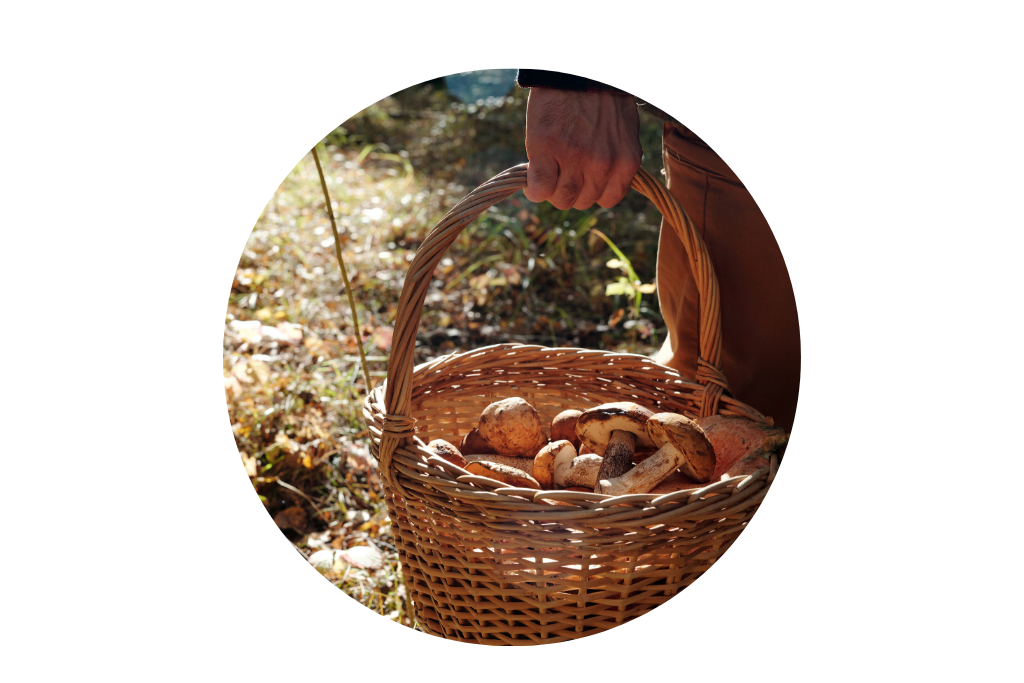



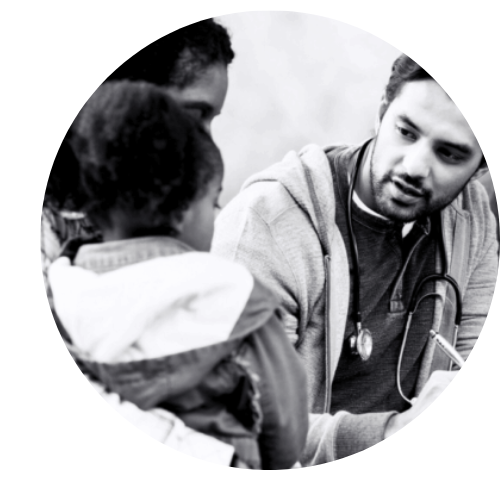



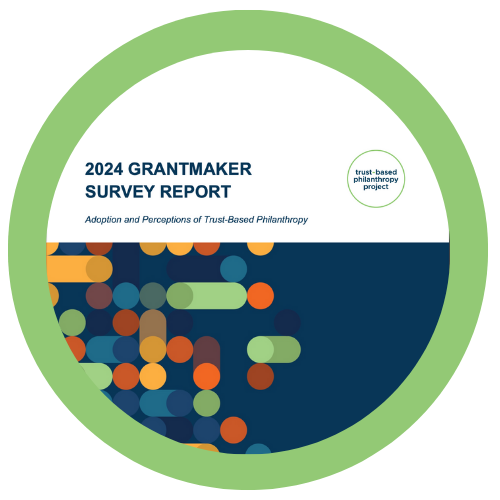

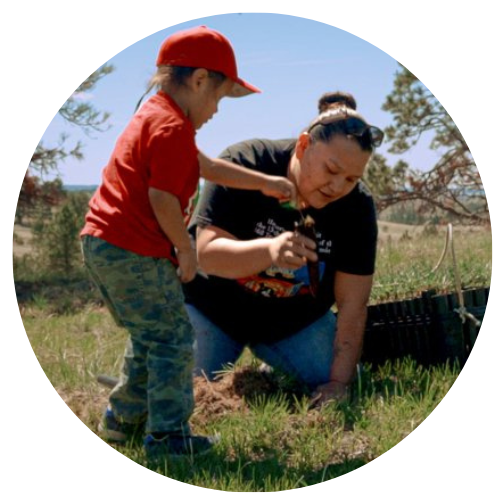



















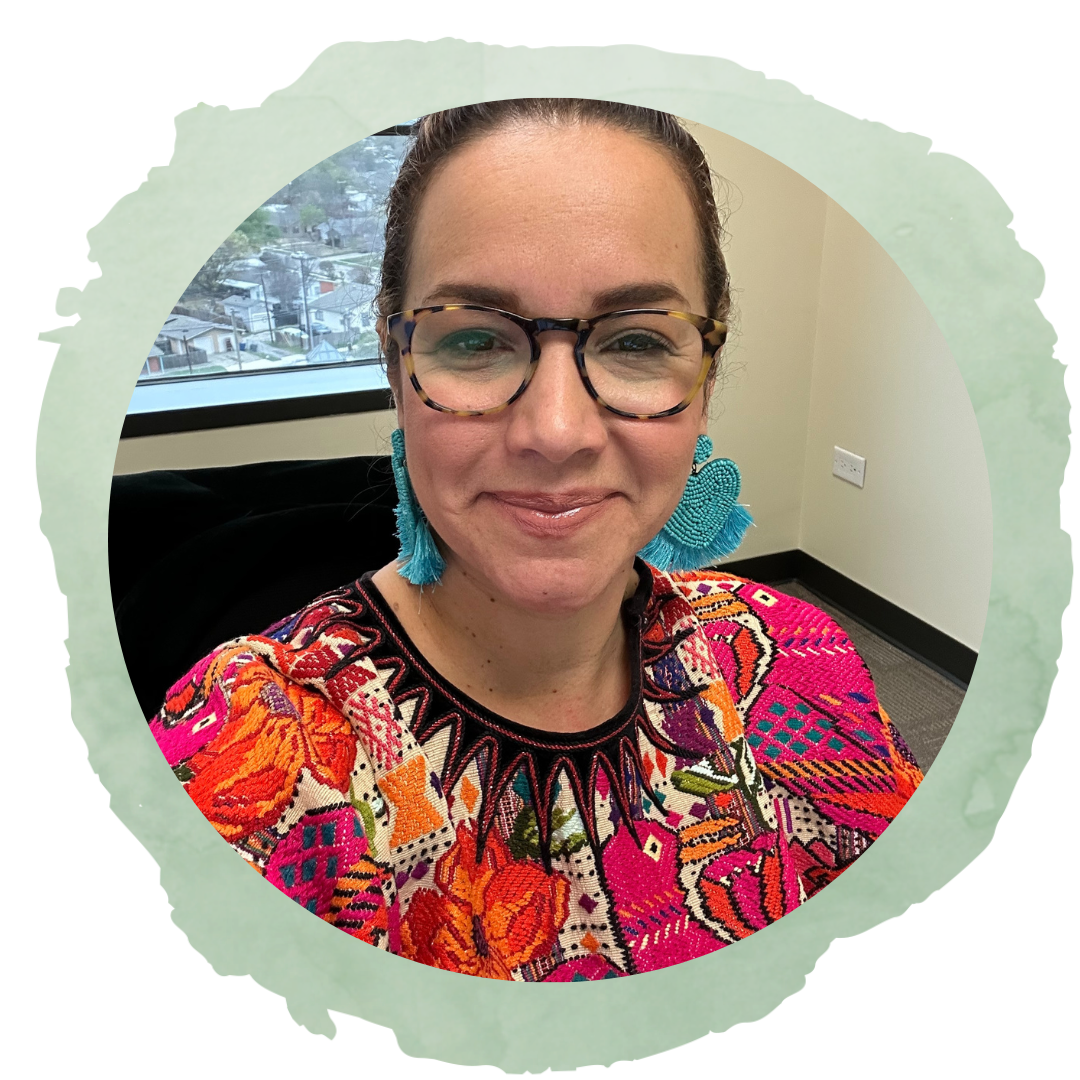


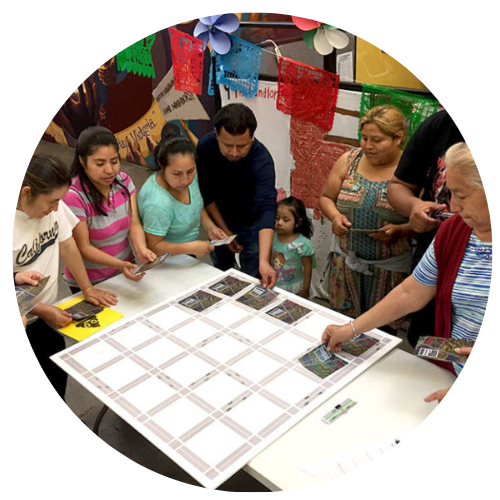


















































































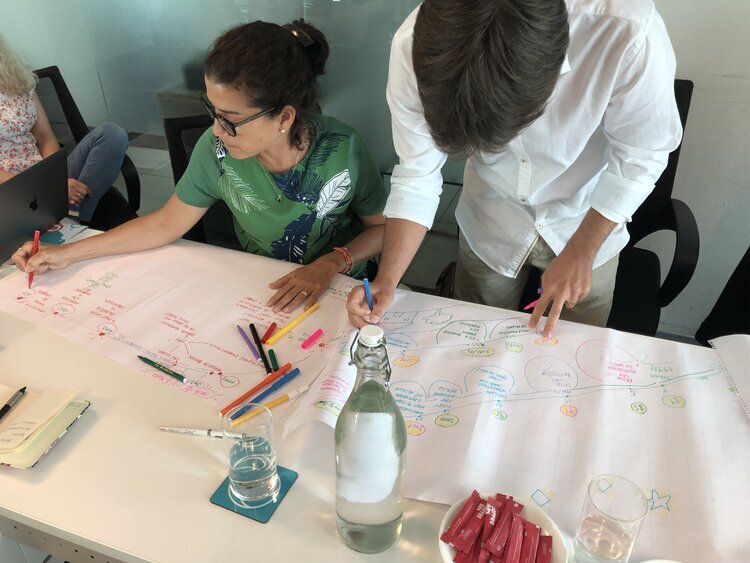

























“We need to change how we think about those who control the wealth and resources and those leading the work to achieve systemic change and racial justice.” -Isabel Sousa Rodriguez